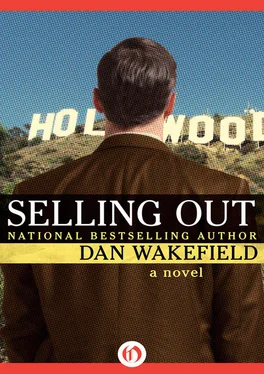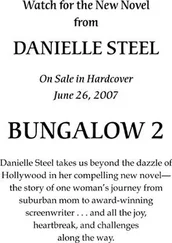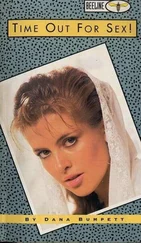DANNY
Here Spot, here Spot, here Spot!
Perry read the page over, smiling. He stood up, clapped his hands, and stuck a clenched fist in the air, triumphant.
He felt like a Rocky of writing!
The chips were down, but he was going to come through to glorious victory, he was going to win in the end, against all the odds. On the verge of being broke, abandoned by his wife (she had become increasingly villainous in his self-explanation of their separation, a deserter who left the ship at the first signs of a leak), the great but unappreciated literary man was relegated by the crass commercial creeps of Hollywood to a low-paying rewrite of a turkey script about a psychic dog, conceived by a hysterical producer who seemed to be a mad combination of the Marx Brothers and Gertrude Stein.
Did the great writer despair and throw in the towel, slinking back East in defeat with his tail between his legs and his pride dragging behind him like a leash?
No way, José!
The coke had worked.
It acted like a jolt on his imagination, enabling him to break through and write the story of the ordinary family and their psychic dog! Well, not all of it yet, but twenty-five pages of it—enough to show Larman Kling.
When he was high, it seemed fabulous.
Well, he was no fool, he realized part of that response was due to the drug, and when he’d read the stuff he’d written when he’d come down and was straight, it didn’t seem nearly as wonderful. In fact it didn’t seem wonderful at all.
“Run, Spot, run.”
Holy Mother of God.
A grown man had written that line. A professional writer, one whose short stories had been published in distinguished magazines and won prestigious prizes.
“Run, Spot, run.”
Hey, wait a minute. Who the hell said a rewrite of a script about a psychic dog was supposed to be a great work of art, anyway?
Perry had a glass of wine and read over the pages again.
Maybe it wasn’t so bad after all.
It was better than nothing.
It was worth the $100 a day it cost in coke to keep the pages coming out.
Perry figured that was a business expense.
Larman Kling was pacing the room as he read, dropping the pages as he finished them, casting them away like leaves that wafted down through the air to settle on the floor or on one of the many mattresses or water beds. Perry had no idea if this shedding process meant that the eccentric producer didn’t like what he saw or was so engrossed in the script, so totally transported by the story, that he didn’t even want to be bothered by putting back the pages, perhaps wasn’t even aware that he was spilling them all across the room.
Perry could feel his heart pounding. Just before coming up he had slipped into a men’s room of one of the restaurants on the ground floor of the building, and had a hit of coke. It was already wearing off, and as Larman Kling kept pacing and tossing off pages and mumbling without really uttering any words, Perry’s panic began to rise. He also had a stabbing headache that wasn’t helped by the sunlight blasting through the glass walls of the enormous room, striking Perry’s eyes like a fist.
Larman Kling tossed away the last page and continued to pace, fiercely rubbing his head now with his knuckles, then suddenly turned to Perry and started to bark. Like a dog. The sound came out in sharp, staccato sounds—“Erf! Erf! Erf!” Perry didn’t know if he was supposed to bark back, so he simply nodded, wanting to make some response, some acknowledgment.
The worst part was that Perry had no idea if Kling’s outburst of barking meant that the script was so wonderfully real he felt exactly like Spot, the heroic dog, or whether he thought the script itself was a dog. Was he barking in praise or complaint?
As Perry was trying to decipher the riddle of Kling’s behavior, the producer suddenly went down on his hands and knees, barking louder, starting to growl, and walking toward Perry on all fours. Perry sat frozen, not speaking or moving, feeling he was locked in a nightmare.
As Kling came closer, panting now and wagging his tongue, Perry prayed that the imaginative producer would not for any reason lift one of his legs and spray.
“You haven’t got the dog, that psychic dog, or any kind of dog, or anyone or anything else,” said Kling, staring up into Perry’s eyes.
Perry’s heart accelerated, feeling both fear and anger. What was he doing, sitting on a mattress in a high-rise penthouse in Los Angeles, while a man on all fours criticized his work?
“You didn’t like anything?” he asked.
Kling stood up, brushing himself off.
“That’s all in the past, the distant past, over and done and past now,” he said. “But I don’t give up on a good man, no. We start now. The dog is the start, the key, the open sesame, we get you knowing the dog, the rest will come, oh yes, you’ll see—come with me!”
They went in Larman Kling’s private limo.
“The Arvendale Kennels!” he told his driver.
“Where’s that?” Perry asked.
“Inglewood. Near the Forum. You like basketball? The Lakers? Speed, finesse, speed.”
“Yes,” Perry said. “Absolutely.”
Kling pulled down a panel that brought forward a miniature bar. For a moment Perry’s heart leaped, hoping they could have some champagne, or at least a little wine. He could use something.
“Take your pick, select, everything chilled,” Kling said.
Perry leaned forward and saw to his dismay that the bar contained only an array of vegetable juices. He selected a can of V-8, figuring he could at least pretend it was a Bloody Mary.
Kling took a papaya juice, shut the bar, and slipped a tape in the stereo deck. Perry braced himself, praying it was nothing jarring, no heavy metal rock or angry punk. He couldn’t even have stood a Beethoven symphony.
Thankfully, the tape wasn’t even music.
It was surf sounds.
Kling took two black masks from a kind of pocket below the bar and handed one to Perry. What the hell, were they going to commit a crime? Perhaps steal a psychic dog from the Arvendale Kennels? Evidently not, for the mask had no eyeholes. Kling slipped his down over his head so it covered his eyes, then leaned back in the seat, motioning Perry to do the same.
“Relax,” he said. “Clears the head, empties the mind, prepares for new absorbing.”
Perry did as he was told. Except that he couldn’t empty his mind. Everything indeed was black now and there was only the sound of surf, which was supposed to be soothing, but Perry kept picturing scenes of past mistakes, embarrassments. If only he had stuck with Ned Gurney he might be sharing the benefits of his being hot now, might be working on a class picture, writing a quality script, and conferring daily with a civilized man. Instead he was in the back seat of Larman Kling’s limo, masked, sipping V-8 juice, listening to surf sounds, and speeding toward a dog kennel in Inglewood for what incredible purpose he didn’t even want to guess.
“Come down, down here, with us!” Larman Kling called.
He was on all fours, nose to nose with an Airedale. He was sniffing the dogs, rubbing up against them, barking at them.
“Got to learn their language, how they speak, think!” he explained.
Perry did what he was told. He got down on his hands and knees and tried to talk to the dogs. A menacing-looking Great Dane growled at him.
Perry flinched and moved on to a friendly terrier who licked his face.
“Speak!” Kling ordered.
Perry barked.
The terrier barked back.
Kling, smiling, urged him on, barking himself.
Is this what I was born to do? Perry wondered. Is this where I’m supposed to be, in my life? This was not even a story he would want to recount at faculty cocktail parties. For a moment he wanted to crawl over and bite Larman Kling, severing an artery and rendering the mad producer blessedly unconscious. He looked over at Kling, who was barking now even more enthusiastically, gathering a whole pack of dogs around him, waving to Perry to come and join in the canine conference. Perry understood of course that Kling was doing all this to try to help him get into the script, to be able to write the part of the dog. He realized, with a powerful, disorienting mixture of appreciation and revulsion, this man is trying to help me .
Читать дальше












